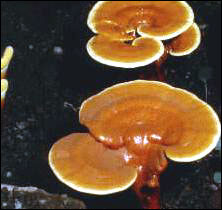Reishi paddestoel
De Reishi paddestoel uit Japan lijkt een boeiend fytotherapeuticum te zijn. Indicaties die genoemd worden, zijn vermoeidheid, hoog cholesterol, HIV en AIDS, hoge bloeddruk, immunostimulatie, ontsteking, stamina, virale infecties. We zullen deze paddestoel eens verder bekijken.
 In de hoed en de stam van de paddestoel zitten biologisch actieve stoffen zoals beta-glucanen, polysaccharides en triterpenen. [1,2] Er zitten stoffen in de paddestoel die immuuncellen in hun functioneren kunnen beinvloeden. [3,4,5,6] In diermodellen bleek deze stof antikankereigenschappen te bezitten. [7] Reishi wordt gebruikt, om het immuunsysrteem bij HIV te stimuleren. Dit omdat extract van de paddestoel de afweer kan stimuleren: macrophagen worden actief en er is een positieve invloed op de zogenaamde interleukines en TNF. [8,9,10,111,12] In klinische studies blijkt de paddestoel het immuunsysteem van kankerpatienten ook positief te kunnen beinvloeden. [13,14,15] En zelfs in een diermodel voor ernstige nierinsufficientie had het paddestoelenextract een veelbelovend effect. [16] Kortom, veel positieve effecten in het laboratorium en in diermodellen en in enkele kleine studies bij mensen. [17]
In de hoed en de stam van de paddestoel zitten biologisch actieve stoffen zoals beta-glucanen, polysaccharides en triterpenen. [1,2] Er zitten stoffen in de paddestoel die immuuncellen in hun functioneren kunnen beinvloeden. [3,4,5,6] In diermodellen bleek deze stof antikankereigenschappen te bezitten. [7] Reishi wordt gebruikt, om het immuunsysrteem bij HIV te stimuleren. Dit omdat extract van de paddestoel de afweer kan stimuleren: macrophagen worden actief en er is een positieve invloed op de zogenaamde interleukines en TNF. [8,9,10,111,12] In klinische studies blijkt de paddestoel het immuunsysteem van kankerpatienten ook positief te kunnen beinvloeden. [13,14,15] En zelfs in een diermodel voor ernstige nierinsufficientie had het paddestoelenextract een veelbelovend effect. [16] Kortom, veel positieve effecten in het laboratorium en in diermodellen en in enkele kleine studies bij mensen. [17]
Beoordeling
Grote klinische studies zijn er volgens ons nog niet, maar de gegevens zijn wel veelbelovend, vandaar oranje.
[1] Huang K. The Pharmacology of Chinese Herbs, 2nd ed. New York: CRC Press; 1999.
[2] Hobbs C. Medicinal Mushrooms, 3rd ed. Loveland (CO): Interweave Press; 1996.
[3] Mao T, et al. Two mushrooms, Grifola frondosa and Ganoderma lucidum, can stimulate cytokine gene expression and proliferation in human T lymphocytes. Int J Immunother 1999;15:13-22.
[4] Shiao MS, et al. Natural products and biological activities of Ganoderma lucidum. Am Chem Soc 1994;342-54.
[5] van der Hem LG, et al. Ling Zhi-8: studies of a new immunomodulating agent. Transplantation 1995;60:438-43.
[6] Mizuno T, et al. Reishi, Ganoderma lucidum and Ganoderma tsugae: Bioactive substances and medicinal effects. FD Rev Inter 1995;11:151-66.
[7] Furusawa E, et al. Antitumor activity of Ganoderma lucidum, on intraperitoneally implant Lewis lung carcinoma in synergistic mice. Phytother Res 1992;6:300-4.
[8] Hsu MJ, Lee SS, Lin WW. Polysaccharide purified for Ganoderma lucidum inhibits spontaneous and Fas-mediated apoptosis in human neutrophils through activation of the phosphatidylinositol 3 kinase/Akt signaling pathway. J Leukoc Biol 2002;72:207-16.
[9] Tao J, Feng KY. Experimental and clinical studies on inhibitory effect of ganoderma lucidum on platelet aggregation. J Tongji Med Univ. 1990;10(4):240-3.
[10] Gao Yihuai, et al. Mechanism of the antiulcerogenic effect of Ganoderma lucidum polysaccharides on indomethacin-induced lesions in the rat. Life Sci. 2002 Dec 27;72(6):731-45.
[11] Wang, Sheng-Yuan, et al. The anti-tumor effect of Ganoderma lucidum is mediated by cytokines released from activated macrophages and T lymphocytes. Int J Cancer. 1997 Mar 17;70(6):699-705.
[12] Chen HS, et al. Studies on the immuno-modulating and anti-tumor activities of Ganoderma lucidum (Reishi) polysaccharides. Bioorg Med Chem. 2004 Nov 1;12(21):5595-601.
[13] Gao Y, et al. Effects of ganopoly (a Ganoderma lucidum polysaccharide extract) on the immune functions in advanced-stage cancer patients. Immunol Invest. 2003 Aug;32(3):201-15.
[14] Wachtel-Galor S, et al. Ganoderma lucidum (‘Lingzhi’); acute and short-term biomarker response to supplementation. Int J Food Sci Nutr. 2004 Feb;55(1):75-83.
[15] Wachtel-Galor S, Tomlinson B, Benzie IF. Ganoderma lucidum ("Lingzhi"), a Chinese medicinal mushroom: biomarker responses in a controlled human supplementation study. Br J Nutr. 2004 Feb;91(2):263-9.
[16] Futrakul N, et al. Ganoderma lucidum suppresses endothelial cell cytotoxicity and proteinuria in persistent proteinuric focal segmental glomerulosclerosis (FSGS) nephrosis. Clin Hemorheol Microcirc. 2004;31(4):267-72.
[17] Sliva D.Cellular and physiological effects of Ganoderma lucidum (Reishi). Mini Rev Med Chem. 2004 Oct;4(8):873-9.

